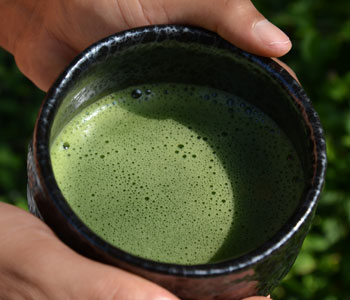
For over 4,000 years the Chinese have used tea as a medicine for inflammation, fever, anxiety and a host of other health concerns. They introduced visiting Japanese Zen Buddhist monks to its wonderful healing properties in the 8th or 9th century in the form of a tea-cake ground into powder. This is matcha! Yet it was another 4 centuries before this powerful powder gained wide recognition in Japan.
Early in the 13th century the Japanese monk Eisai wrote his soon to become a famous book, “How to Stay Healthy by Drinking Tea” (Kissa Yōjōki) which begins with the sentence: “Tea is the ultimate mental and medical remedy with the ability to make one’s life more full and complete.” Esai was referring to what we call matcha: nature’s ultimate tea.
What is Matcha?
Essentially, matcha means ‘powdered tea.’ It is a non-fermented green tea made by grinding the entire tea leaf into powder. Tea leaves destined to become matcha are shade-grown, promoting high chlorophyll and L-theanine production. Traditionally hand-picked, these rich green leaves are lightly steamed to prevent oxidation, de-stemmed and de-veined and stone-ground into an ultra-fine dark green powder.
Unlike regular teabags which are steeped, matcha powder is mixed with water and consumed in its entirety. Thus, matcha drinkers ingest substantially higher concentrations of health-inducing antioxidants, vitamins and minerals.
The Calculations
Results for recent ORAC (Oxygen Radical Absorption Capacity) tests show one gram of Matcha contains 1,384 ORAC Units1 – compared to blueberries that contain just 24 units2. Matcha is also extremely high in catechins, especially EGCG (epigallocatechin gallate). A study published in the Journal of Chromatography in 2003 determined that matcha tea contains approximately 3 times more EGCG than regular “brewed” green tea3.
Today, a headline like “Stay Healthy by Drinking Tea” would capture a great deal of attention and possibly become a best-seller. 800 years later genuine matcha tea remains nature’s “ultimate mental and medical remedy.”
1 ORAC Analysis on Ceremonial Matcha Green Tea ME17916 Lot # D1805: Brunswick Laboratories
2 USDA Agricultural Research Service: learn more here / Journal of Nutrition (vol. 128, pp. 2383-2390); American Journal of Clinical Nutrition (vol. 68, pp. 1081-1087)
3 PMID: 14518774 [PubMed – indexed for MEDLINE], Department of Chemistry, University of Colorado at Colorado Springs, Colorado Springs, CO 80918, USA